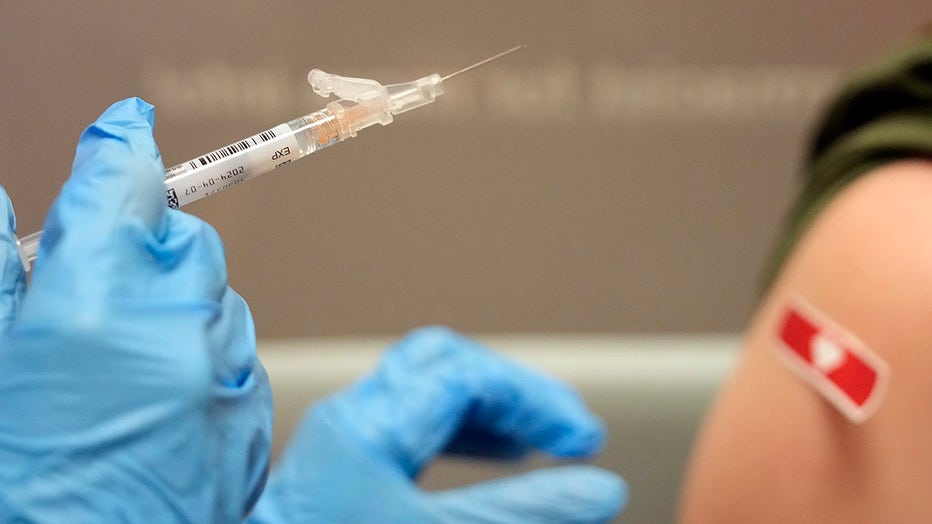Largest-ever COVID vaccine study links shot to small increase in heart, brain conditions

Texas AG sues Pfizer over COVID-19 vaccine
Texas Attorney General Ken Paxton is suing Pfizer, alleging that the pharmaceutical giant lied about the effectiveness of its COVID-19 vaccine. LiveNOW's Carel Lajara spoke about the lawsuit with Infectious disease expert Dr. Peter Chin-Hong.
The largest COVID vaccine study to date has identified some risks associated with the shot.
Researchers from the Global Vaccine Data Network (GVDN) in New Zealand analyzed 99 million people who received COVID vaccinations across eight countries.
They monitored for increases in 13 different medical conditions in the period after people received a COVID vaccine.
The study, which was published in the journal Vaccine last week, found that the vaccine was linked to a slight increase in neurological, blood and heart-related medical conditions, according to a press release from GVDN.
LONG COVID IS HIGHEST IN THESE STATES, SAYS NEW CDC REPORT
People who received certain types of mRNA vaccines were found to have a higher risk of myocarditis, which is inflammation of the heart muscle.
Some viral-vector vaccines were linked to a higher risk of blood clots in the brain, as well as an increased likelihood of Guillain-Barre syndrome, a neurological disorder in which the immune system attacks the nerves.
Other potential risks included inflammation of part of the spinal cord after viral vector vaccines, and inflammation and swelling in the brain and spinal cord after viral vector and mRNA vaccines, the press release stated.
SHOULD THE CDC DROP ITS 5-DAY COVID ISOLATION GUIDELINES? DOCTORS WEIGH IN
"The size of the population in this study increased the possibility of identifying rare potential vaccine safety signals," lead author Kristýna Faksová of the Department of Epidemiology Research, Statens Serum Institut, Copenhagen, Denmark, said in the release.
"Single sites or regions are unlikely to have a large enough population to detect very rare signals."

File: A pharmacist, prepares to give a COVID-19 vaccine in Cypress, Texas, Sept. 20, 2023. (Melissa Phillip/Houston Chronicle via Getty Images)
Doctors react to the findings
Dr. Marc Siegel, clinical professor of medicine at NYU Langone Medical Center and a Fox News medical contributor, was not involved in the research but commented on the findings.
"The massive study and review of the data reveals some rare association of the MRNA vaccines and myocarditis, especially after the second shot, as well as an association between the Oxford Astra Zeneca adenovirus vector vaccines and Guillain Barre syndrome," he told Fox News Digital.
"But these risks are rare," he added, "and other studies show that the vaccine decreases the risk of myocarditis from COVID itself dramatically."
COVID VARIANT JN.1 NO MORE SEVERE THAN PREVIOUS STRAINS, CDC DATA SHOWS
Siegel noted that all vaccines have side effects.
"It always comes down to a risk/benefit analysis of what you are more afraid of — the vaccine's side effects or the virus itself, which can have long-term side effects in terms of brain fog, fatigue, cough and also heart issues," he said.
"Denying or exaggerating a vaccine's side effects is not good science — nor is underestimating the risks of the virus, especially in high-risk groups," Siegel added.
The key is for doctors and their patients to carefully weigh the risks and benefits, the doctor emphasized.
"This study does not really change anything; it just provides much further evidence of what we already know," he said.

Why everyone is getting sick with the flu, COVID-19
Health officials say the number of Americans receiving flu shots and COVID-19 treatments are down (Credit: FOX News/News Edge)
CLICK HERE TO SIGN UP FOR OUR HEALTH NEWSLETTER
Dr. Jacob Glanville, CEO of Centivax, a San Francisco biotechnology company, also reacted to the study’s findings.
"This study is confirming in a much larger cohort what has been previously identified in the original studies during the pandemic — myocarditis and pericarditis as a rare side effect of mRNA vaccines and clots as a rare side effect of the viral vectored vaccines," he told Fox News Digital.
"The odds of all of these adverse events are still much, much higher when infected with SARS-CoV-2 (COVID-19), so getting vaccinated is still by far the safer choice."
This study was part of a more widespread research initiative, the Global COVID Vaccine Safety (GCoVS) Project.
The project is supported by Centers for Disease Control and Prevention (CDC), a component of the U.S. Department of Health and Human Services (HHS).
More than 80% of the U.S. population has received at least one dose of the COVID vaccine, per the CDC.
Fox News Digital reached out to Pfizer and Moderna, makers of mRNA COVID vaccines, for comment.
LINK: FOR UPDATES ON THIS STORY, CLICK OVER TO FOXNEWS.COM

